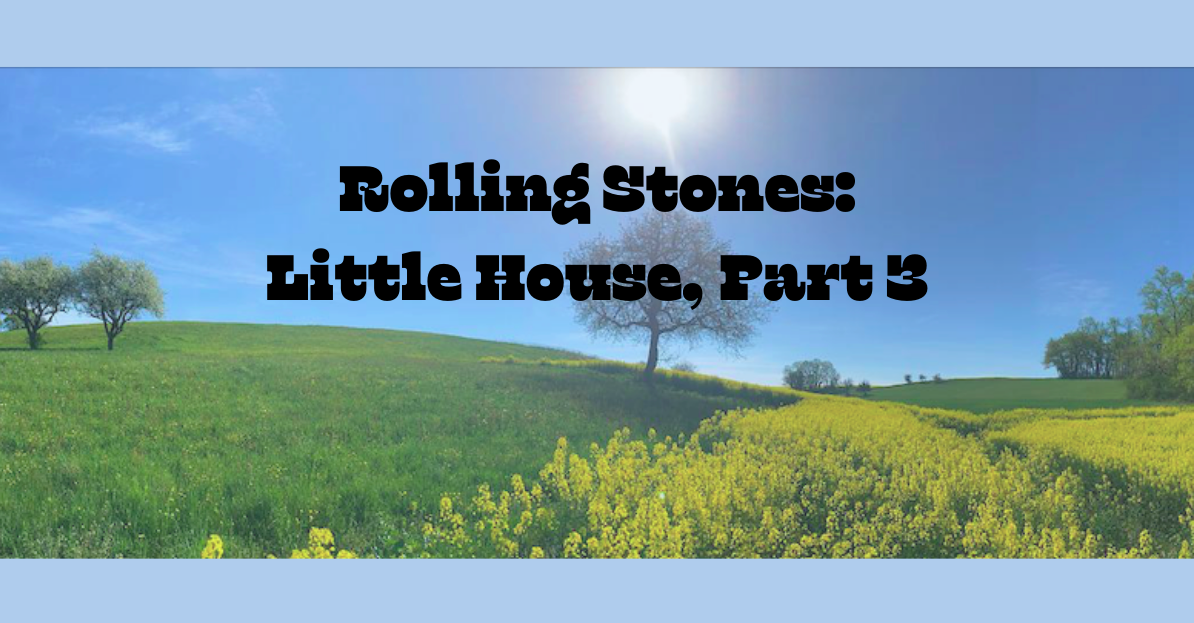Because everyone loves a good story
Rolling Stones: Little House Part 3

You’ve no doubt heard the old adage, “A rolling stone gathers no moss.” That was certainly true of the Ingalls family. I did a quick count and found that they moved at least eight times during her childhood. Many families may top that today, but I bet they aren’t riding for months with all their worldly goods in a covered wagon.
But the motivation for the Ingalls’ moves is what really gets me thinking. While I’ve already expounded on the admirable aspects of the Ingalls, I want to take a moment to share my perplexities about them, too.
ISOLATION
In the first book of the series, the Laura Ingalls and her family live in Wisconsin. Their house seems secluded, but they get to see family on special occasions like Christmas and maple-syrup-making parties. Then they move to Minnesota and it’s even lonelier. The further west they go, the fewer people they see.
I consider myself an introvert, but this is crazy. To have almost no conversations with anyone outside my own house for months on end when I used to live near family and other people…I’d start to wonder what the point was. Pa Ingalls was the deciding factor in many of these moves, and while it’s not stated explicitly, I suspect Ma started to wonder what the point was a well.
EDUCATION
Today’s instant access to a world of information is a blessing and a curse. But I’m willing to put up with the internet, news streams, and entertainment culture if it includes the ability to visit local libraries and enjoy bulging bookshelves at home. In addition to some academic primers, the Ingalls owned just two books: the Bible and “the big green book” called Wonders of the Animal World. The family pored over these for years before adding a few Christian periodicals and a book or two of poetry to the collection.

This probably wasn’t uncommon for families in their situation, but it must have been quite a strain mentally. To have very little human or written stimulation would leave one’s brain feeling anemic. That’s why Ma was determined to live close enough to town so the girls could attend “real” school, and Mary could go away to a college for the blind. Since Ma had been a teacher before she had children, you can imagine how trying it must have been for her to stay home all day, every day with no new thoughts to ponder. For all its downsides, at least society today offers a plethora of knowledge to anyone who seeks it.
MOTIVATION
The real puzzler to me is why they did all this. They had a nice home near family at the beginning of the series, and then they endured trials, tribulations, and a few triumphs for the next twenty years before settling down for good. And it was all in pursuit of the American Dream: the promise of untamed land, bountiful crops, and freedom.
Now, I’m a pretty independent person, but I don’t understand moving so far west that you’re countless miles from any supplies or other humans. I know Pa wanted good farmland and a variety of vermin to trap and eat. He felt that if he kept heading west, he’d find a second Eden eventually. But things were so untamed that much of the land was nearly unusable, and the wildlife was so wild that it decimated the crops time and again. So even though I know what they were pursuing, I guess I lack that part of the American spirit.
A PERSON’S PURPOSE
As humans, we were made for God and other people. That design has been clear since God formed Adam in Genesis. Sure, a family is made up of people, and if that’s all you have, then it is enough. But I don’t believe we’re cut out for living in isolated pockets of the prairie long term. The Ingalls’ story proves this. When they were isolated, terrible things happened, and often the presence of just one or two other people made all the difference.

They nearly died of scarlet fever, but a traveling doctor found them in their home just in time. They were nearly killed by Indians who were rightly outraged at the loss of their territory, but one Indian they had befriended protected them. They nearly starved to death during a seven-month winter, but two young men risked their lives to find grain for the town. Even Christmas day was made more special when a distant neighbor dropped in with gifts. It wasn’t the land or the freedom that came through for them again and again; it was other people.
MY TAKEAWAY
As I said in my first post of this series, I’ve really enjoyed the Little House books. They were surprisingly engaging and habit-forming. I am in awe of the skills, education, and lifestyle of the Ingalls family, and I hope to live up to some of their example.
But with all that being said, I don’t believe their hunger for new land, bountiful crops, and adventure was worth the cost. When a whole nation of Ingalls pursued the American Dream, Native Americans were bulldozed from their homes, natural resources were exhausted, the natural order was disrupted, and what was once beautiful and pure was leveled, stripped, and decimated. Add that to the isolation, and I believe was too high a price all around.
But Pa Ingalls and I clearly disagree on this point, and Laura agrees with Pa. Her sense of adventure was dauntless. Without their journey, we would have missed this priceless gem of living history, this tribute to the pioneers, and this reminder of what we’ve lost and what we’ve gained. And because of those things, I’m thankful for Little House on the Prairie.

Add a comment, and join the conversation!